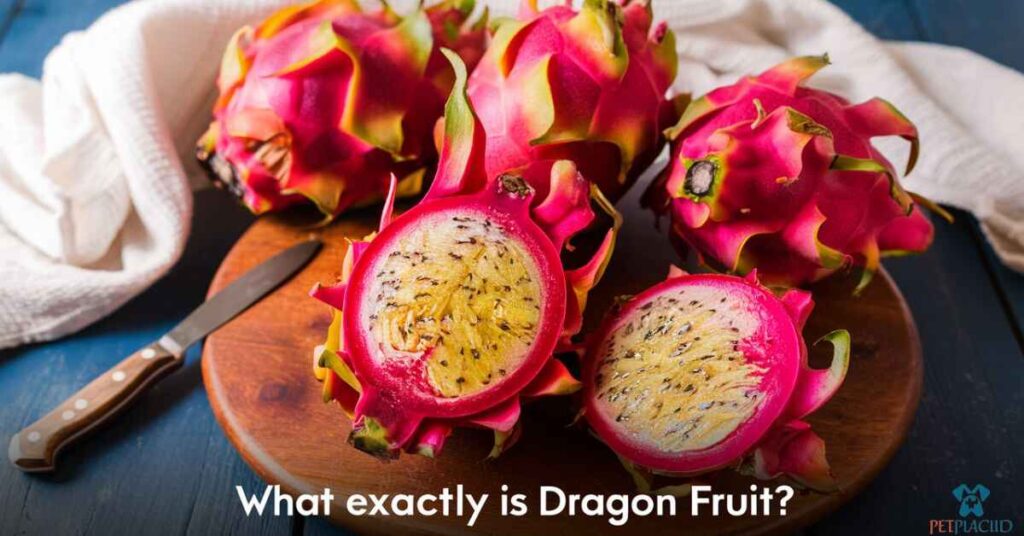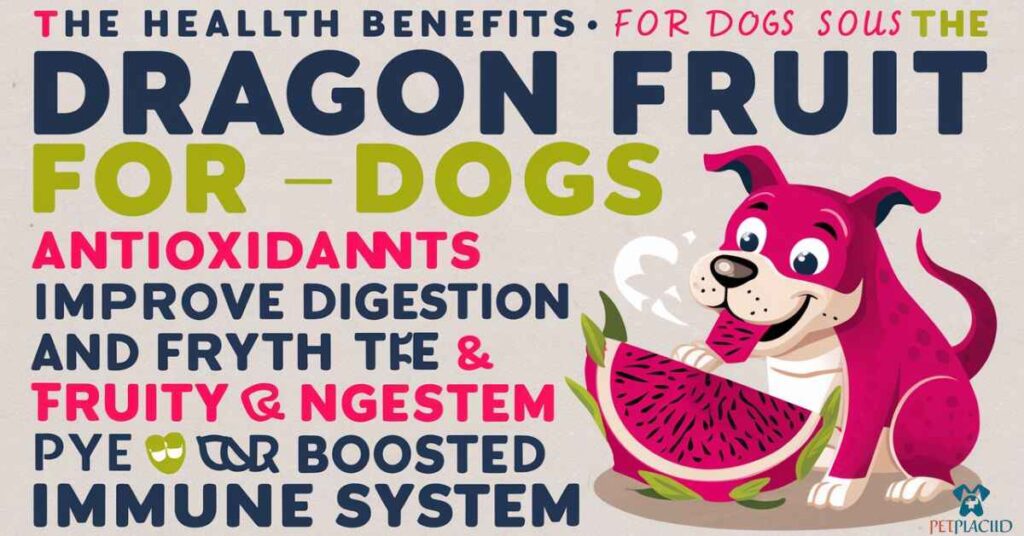As loving pet parents, we want nothing more than to shower our furry companions with all the treats and goodies they desire. However, it’s crucial to remember that not all human foods are safe for our canine friends.
Enter dragon fruit, the vibrant and exotic tropical fruit that has taken the world by storm. But can our dogs enjoy this unique delicacy, or is it off-limits?
In this comprehensive guide, we’ll dive deep into the world of dragon fruits (also known as pitahaya) and explore whether they make a suitable treat for our beloved puppies.
We’ll uncover the potential health benefits, risks, and proper ways to introduce this fruit to your pup’s diet. So, sit tight, and let’s embark on a journey to unravel the mysteries surrounding canine nutrition and tropical fruits for dogs.
What Exactly Is Dragon Fruit?

Before we delve into whether dogs can indulge in dragon fruit, let’s first understand what this exotic treat is all about. Native to Central America, dragon fruit is a striking and visually appealing fruit that boasts a vibrant red skin and a sweet, seed-speckled pulp that comes in various colors, including white, red, yellow, and pink.
Nutritionally, dragon fruit packs a punch, offering a valuable source of vitamin C, antioxidants, iron, fiber, and omega-3 fatty acids. These nutrients have been lauded for their numerous health benefits in humans, but what about our canine companions?
Is Dragon Fruit Safe for Dogs to Consume?
The short answer is yes, dragon fruit is generally safe for dogs to consume in moderation. This exotic fruit is non-toxic to our furry friends and can even provide some valuable pet health benefits. However, it’s important to note that dragon fruit should not replace your dog’s regular, balanced diet but rather serve as an occasional treat.
Health Benefits of Dragon Fruit for Dogs

While dragon fruit may not be a staple in your dog’s diet, it can offer some exciting health advantages when consumed in moderation. Here are a few potential benefits:
- Boosting the Canine Immune System:
Dragon fruit is an excellent source of vitamin C, a powerful antioxidant that helps strengthen your pup’s immune system, ensuring they remain energetic and resilient against various illnesses.
- Promoting Longevity:
The antioxidants present in dragon fruit can help reduce the risk of chronic diseases and slow down the aging process, potentially contributing to a longer, healthier life for your canine companion.
- Aiding Digestion and Gut Health:
With a significant amount of fiber, dragon fruit can aid in smooth digestion and optimal gut health by ensuring your pup absorbs the maximum nutrients from their diet. The black seeds, especially in the yellow dragon fruit, are a natural laxative, which can be beneficial for dogs experiencing constipation.
- Supporting Healthy Skin and Coat:

Dragon fruit contains omega-3 fatty acids, which are essential for maintaining a glossy coat and healthy skin in dogs. Additionally, these fatty acids play a vital role in cognitive development and function, making dragon fruit a smart addition to your pup’s diet for overall well-being.
- Boosting Heart Health:
The fatty acids and antioxidants present in dragon fruit can contribute to maintaining a healthy heart in dogs, reducing the risk of cardiovascular issues.
While these potential benefits are exciting, it’s always best to consult with your veterinarian before introducing any new supplements or significant dietary changes to your pet’s routine.
Potential Risks of Feeding Dragon Fruit to Dogs
As with any treat, there are a few potential risks to be aware of when feeding dragon fruit to your furry friend:
Weight Gain:
Dragon fruit contains a high dose of natural sugars. While this makes it deliciously sweet, overconsumption can lead to weight gain and high blood sugar levels in dogs, especially those prone to obesity or diabetes.
Digestive Issues:
If consumed in large quantities, dragon fruit can cause digestive issues in some dogs, manifesting as diarrhea or an upset stomach, particularly in pets with sensitive digestive systems.
To avoid these potential risks, it’s essential to practice dietary moderation for pets when introducing dragon fruit to their diet.
Always remember, moderation is key when feeding dragon fruit to your furry friend.
How to Properly Feed Your Dog Dragon Fruit

Now that you understand the potential benefits and risks, it’s time to learn how to safely introduce dragon fruit to your pup’s diet. Here are some tips to keep in mind:
- Start Small:
Begin by cutting the dragon fruit into small pieces and offering a small portion to your dog. This initial taste test will help you determine if they like the fruit and if their stomach handles it well.
- Remove the Skin:
Always peel and remove the inedible skin of the dragon fruit before giving it to your dog. The skin can be tough to digest and may pose a choking hazard.
- Moderation is Key:
Treat dragon fruit as an occasional treat, not a staple in your dog’s diet. Overindulgence can lead to the risks mentioned earlier.
- Observe Your Dog:
After feeding your pup dragon fruit, closely monitor them for any signs of digestive distress, such as vomiting or diarrhea. If you notice any adverse reactions, stop feeding them the fruit and consult your veterinarian.
- Mix It with Their Regular Food:
Consider mixing small pieces of dragon fruit flesh into your dog’s regular food for a more balanced approach. This can enhance the nutritional value of their meal while keeping the fruit’s quantity in check.
- Avoid Processed Forms:
Stick to fresh dragon fruit. Avoid feeding your dog canned or processed versions, which may contain added sugars or preservatives that are not healthy for them.
By following these guidelines, you can safely introduce dragon fruit as a pet treat safety measure and a fun way to mix up your pup’s diet.
Related Post:
Can Dogs Eat Dragon Fruit Seeds?
One common question that pet owners have is whether the seeds of dragon fruit are safe for their dogs to consume. The good news is that the seeds are non-toxic and generally safe for dogs to eat. However, it’s important to monitor the quantity, as the seeds may have a laxative effect due to their high fiber content.
If you’re concerned about potential digestive issues, you can remove the seeds before feeding dragon fruit to your pup. Alternatively, you can leave a few seeds in and observe your dog’s reaction. If they seem to handle them well, you can gradually increase the amount of seeds in their portion.
Conclusion
In conclusion, dragon fruit can be a fun, healthy, and occasional treat for your beloved canine companion. This exotic fruit offers a range of pet health benefits, including boosting immunity, promoting longevity, aiding digestion, supporting healthy skin and coat, and even contributing to heart health.
However, it’s crucial to remember that moderation is key. Dietary moderation for pets is essential when introducing new foods, as overindulgence can lead to weight gain, high blood sugar, and digestive issues. Always consult with your veterinarian before making significant changes to your pet’s diet or if you have any concerns.
As a responsible pet owner, continue to research and explore other pet-safe fruits and vegetables that can add variety and nutrients to your pup’s diet. Remember, a balanced dog diet is the key to ensuring your furry friend lives a long, happy, and healthy life.
So, go ahead and let your dog indulge in the tropical delight of dragon fruit, but do so responsibly and with the guidance of your trusted veterinary consultation for pet diets. Your pup will thank you for the occasional treat while staying safe and healthy.
Real-Life Example: Timo the Corgi’s Love for Dragon Fruit
“As a proud pet parent to the adorable Timo The Corgi ASMR, I’ve always been cautious about introducing new treats to his diet. However, when I discovered dragon fruit, I couldn’t resist letting him try this exotic delight. To my delight, Timo took to it like a champ! He loved the sweet, refreshing taste and would eagerly await his small portions of dragon fruit as a special treat after his walks. Of course, I always made sure to remove the inedible skin and monitor his portions to avoid any digestive upset. Seeing the joy on his face as he enjoyed this healthy snack made me grateful for the resources available on fruit consumption for dogs. It’s a treat we both look
Frequently Asked Questions
Is dragon fruit toxic to dogs?
No, dragon fruit is not toxic to dogs. It is safe for them to eat in moderation.
Is any part of dragon fruit poisonous?
No part of the dragon fruit is poisonous to dogs. However, the skin should be removed as it is hard to digest.
Is dragon fruit good for cats and dogs?
Yes, dragon fruit is good for both cats and dogs. It provides vitamins, antioxidants, and fiber that are beneficial for their health.
Can I give my dog frozen dragon fruit?
Yes, you can give your dog frozen dragon fruit. Make sure it is cut into small, manageable pieces to avoid choking hazards.
How to prepare dragon fruit for dogs?
Peel the skin off the dragon fruit and cut the flesh into small pieces. Serve it fresh or mix it with their regular food.
Is dragon fruit good for dogs?
Yes, dragon fruit is good for dogs. It offers vitamins, antioxidants, and omega-3 fatty acids that support their overall health.







